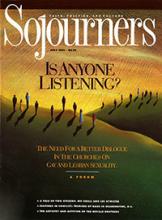Most temporary residents of our nation's capital -- in other words, elected representatives and their staff people -- are eminently unmemorable. Personnel changes on Capitol Hill generally are merely cosmetic. But thus far in 1991, two dramatic changes have taken place, and they are worthy of note.
One of the great legislators and caretakers of the common good, Rep. Morris Udall (D-Ariz.), retired on May 4 after more than 15 full terms in the House of Representatives. The Parkinson's disease that had plagued Udall for more than a decade and was exacerbated by a fall in his home finally took its toll. Udall could no longer fulfill his duties.
Few politicians have held the good of the country -- all of it, especially its least protected elements -- so close to their heart. Udall's integrity and wit combined to make him one of the most popular and effective members of Congress in memory.
On issues of water conservation, protection of federal lands, campaign finance reform, and the tribal rights of American Indians, Udall championed the well-being of the disempowered, the wilderness, and the future. This did not always bring him popularity in the Arizona district he had represented since 1961. Still, Udall's strong commitment to principle and integrity brought him the support of many who disagreed with his politics.
"He was willing to take risks that no one else would," said Patty Marks, an attorney with a Washington, DC law firm representing a number of Indian Nations. "And under his leadership on the Interior Committee, Indian issues were not used as leverage to pass anything else in the House. Virtually all of the positive legislation to come out of Congress since his arrival has had Udall's stamp."
Read the Full Article
